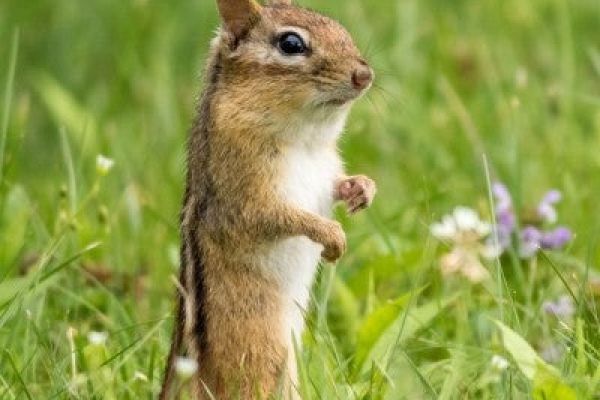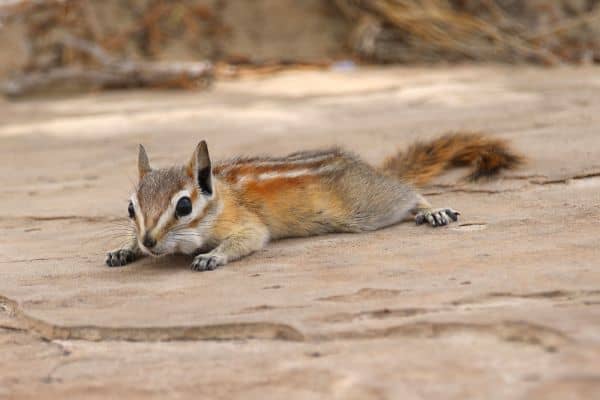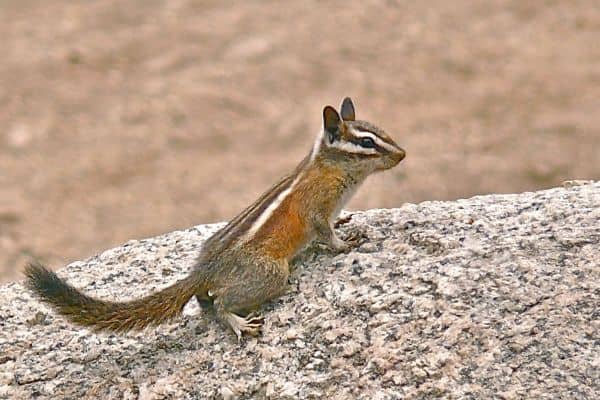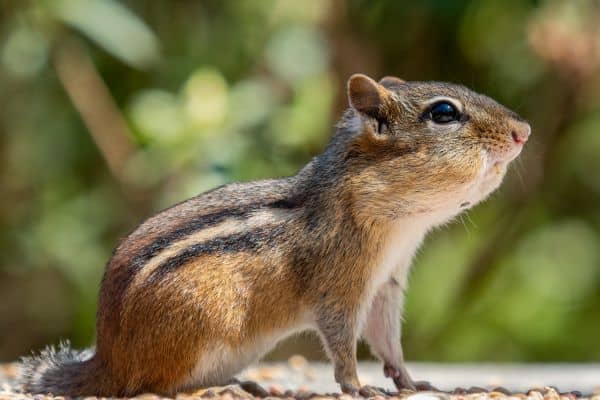Chipmunks are a squirrel family of animals that are small in size and mostly feed on bird feeders. They are known for not damaging plants like voles, moles, and rats as they also help a lot to maintain a healthy ecosystem.
But still, if you want to get rid of chipmunks here you can find all the necessary steps to identify and get rid of chipmunks:
Chipmunks: Friend or Foe?
Chipmunks generally don’t do much damage compared to other garden pests and lots of the damage is mostly done by animals like voles, moles, and rats. But remember that having a few chipmunks can reduce a lot of headaches for your garden and benefit gardens and other landscapes in certain ways.
Also, remember that they indicate a healthy ecosystem, and chipmunks provide an important food source for larger animals like hawks, owls, and bobcats. They also help to aerate soils when burrowing and as they have a habit of burying seeds and nuts, they help to sow countless plants and trees. You may also love chipmunks to stick around your garden and may find lots to love about them.

Signs of Chipmunk Activity in Your Yard and Garden
Chipmunks are mostly active during the day so if your yard and garden has one of them you can see them flitting around your yard and popping in and out of bird feeders. But if you are not sure if your yard and garden have chipmunks or other pests and animals you can look for these key signs to confirm:
1. Missing flower bulbs and tubers
If your plants have missing tubers, dahlias, crocuses, tulips, and other ornamentals that means your yard and garden have chipmunks but if flower bulbs are missing then that’s because of voles, mice, and other rodents.
2. Crop damage
Remember that chipmunks most of the time won’t do any damage to food crops but they will take bite out of tomatoes, beans, corn, and other produce when they begin to ripen. Mostly they love berries, and they love snacking on fresh strawberries.
3. Small holes and tunnels in flower beds and lawns
Chipmunk tunnels are relatively smaller than moles and vole tunnels. They also don’t mound up the earth at the entrances of their burrows. If your yard or garden is 1- to 2 inches wide near your flower beds or lawn then that is chipmunk activity.

How to Prevent and Get Rid of Chipmunks
Preventing and getting rid of chipmunks is hard it can take a lot of work and it’s not always effective. It’s only easy to prevent chipmunks from having large populations in your yard and garden with different methods and some of them are as follows:
1. Remove Food Sources
The main thing you can do to control chipmunks and their population is to reduce or remove their food source from your yard and garden. You can remove their food sources by removing, hiding, or pest-proofing bird feeders, and securing bird seed and pet food. You can also use thistle or safflower seeds as a bird feeder as they attract fewer chipmunks than other foods.
2. Secure Access Points
You can also secure access points for them but remember chipmunks can fit in very small spaces. Sometimes they can also squeeze into attics and other spots where they’re not wanted. The most you can do to secure access points for them is to use fencing and the walls of your home, garage, or potting shed with grates or hardware cloth which can make them hard to get into your yard and garden.
3. Do a Good Garden Clean Up
You can also do a good clean up of your gardens and yard to keep them away as they feel more at home in wild areas. They are mostly seen around lawns with tall grass, overgrown shrubs, open compost heaps, and wood or rock piles. Cleaning all those things will make chipmunks feel more exposed and may give them a reason to move somewhere else. You can also keep your eyes and invest in a compost bin and keep it covered when it’s not in use.
4. Grow Repellant Plants
You can also grow repellant plants like tulips and crocuses as chipmunks tend to hate them. They also don’t like the scent of alliums, sage, marigolds, and lavender so you can also plant them in your yard or garden. Always remember that herbs and flowers may make gardens a bit more pest-proof and discourage chipmunks from nibbling on nearby plants.

5. Add Hardware Cloth and Bulb Cages
You can also add hardware cloth and bulb caged around the plants that need protection from chipmunks. Remember when you are using hardware cloth you will have to bury them and dip them into the garden as it will help to keep chipmunks away from plants. While using hardware cloth get 1/4-inch of them and shield your plants and also remember to use them on newly planted seeds.
6. Install Chipmunk Baffles
Chipmunks tend to love to be around bird feeders and eat the food but if you love watching songbirds and chipmunks eating the bird food and also you don’t want to keep bird feeders away. Then you can install chipmunk baffles which can help your bird feeders from them. It won’t allow chipmunks to climb up to the seeds and also remember to keep the bird feeder away from trees as they can get there easily as they are excellent jumpers.
7. Try Natural Repellants
There are a lot of long lists of repellant products that you can use against chipmunks from your yard and garden. But you can try natural repellants as repellant products have a lot of chemicals that can harm humans, pets, and plants. You can use blood meal or peppermint oil, predator urine, garlic oil, or cayenne pepper sprays as a lot of gardeners use them to get rid of chipmunks. You can also use ultrasonic repellants or owl decoys for chipmunk control.
8. Use a Live Trap
You can also use a live trap to control chipmunks in your yard and garden but remember that deterrents and prevention is always a better option than trapping. If you trap chipmunks and move them then you will find new chipmunks also in some areas trapping chipmunks is known to be illegal. You should also remember that if you trap chipmunks and move them to a new location they often don’t survive relocation. But if you want to relocate them you should always follow local rules and regulations or you can also get help from a professional pest control company.
Also remember not to use poison baits as it can get you arrested, get the garden harmed, or it can even harm non-target animals like owls and pets.
FAQ
Q. What do chipmunks hate the most?
Chipmunks hate cayenne pepper, vinegar, garlic, and peppermint as they hate most of the strong odors and bitter taste foods.
Q. How can I keep chipmunks out of my garden?
You can use sprinkling deterrents like hot cayenne, garlic, apple cider, peppermint, or coffee grounds around your plants and gardens to keep chipmunks out of your garden.
Q. What food is poisonous to chipmunks?
Foods like peaches, plums, and seed-based rodent diets are poisonous to chimunks.
Also Read: Don’t Have a Garden to Grow Potatoes? Here’s How You Can Plant Them in Containers
